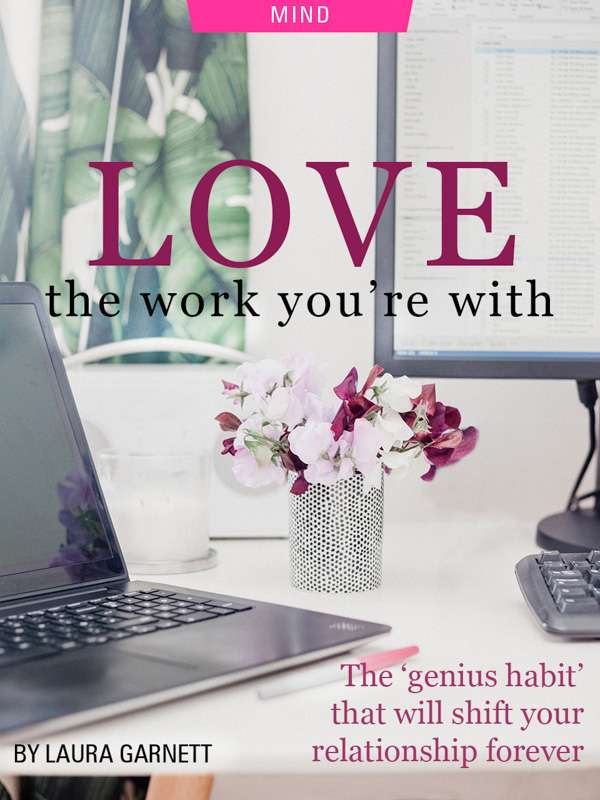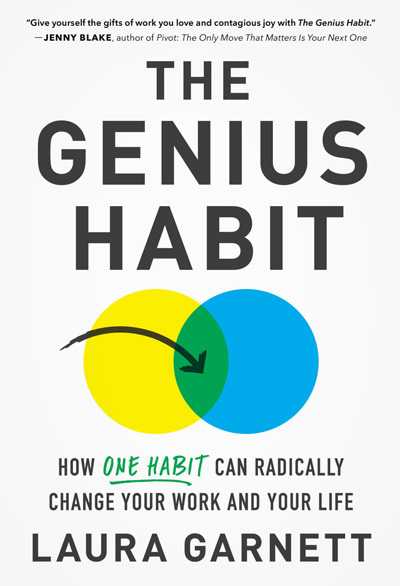The ‘genius habit’ — the missing link to loving work. How to implement one habit that can shift your relationship to work forever.
—
Why is it so hard to love work? It’s confounding that we have 3d printers that are printing body parts to save lives, but that currently, according to Gallop, only 34% of Americans are engaged with work, which is the highest it’s ever been. While it’s encouraging that it’s rising, it still remains that 13% are actively disengaged and 53% are disengaged. That means that 66% of Americans are still not engaged with their work. Why is this?
This is a question that has plagued me for years. It started with my own career crisis 10 years ago. I was working at Google in a job that was the worst fit I could ever imagine. I not only didn’t like work, but I didn’t like myself. I blamed the poor performance on my own inadequacies, rather than seeing the situation for what it really was — a job that I could never succeed in because it intrinsically didn’t match who I was or what I was great at. It took a year of struggle before I remotely began to understand that I needed to make a change. And yet, I felt deflated in the midst of this change.
When I allowed myself to envision something differently, I realized that I actually had big goals for my career.
I had just struggled to see how I could actualize them when everything seemed so directionless. This situation prompted me to start asking some big questions, such as…
What are the jobs that I am going to be great at? What is the impact on others that is most meaningful to me? How can I create the kind of success that I desire?
I took steps — I sought help through hiring coaches and reading every self-help and career book I could get my hands on and spent a year looking for answers anywhere I could find them. After that year, I came up with nothing. I digested tons of material and easily found copious answers to what created success. For example, finding work that was aligned with who you are, being so motivated that you would do your job for free or having high confidence. But I found very little information on ‘how’ to cultivate, find or develop any of these characteristics.
I wanted to know in great detail what were the specific habits that I needed to learn in order to create a new experience at work.
I ended up quitting Google and going to work for a start-up. Within a month, I realized I was in yet another job that was not a great fit for me. My struggle continued. This was in 2009. Within 9 months I was laid off and the start-up crumbled along with the rest of the world. It was at this point that I realized I had to solve my problem on my own.
I needed to create a job that I loved from scratch.
It’s been 10 years since I made that decision — and since I have created a body of work that is meant to help those who may be asking the same questions I was, or just want to take more ownership of their career, but don’t know ‘how.’ My methodology is all about the ‘how.’ My biggest pet peeve is to read a book — have your mind be blown by the ideas, but then feel helpless in knowing how to implement the changes in your life that you just read about.
This is why we run in circles — we don’t know how to bring the practice from the pages into our lives.
This is where, ‘The Genius Habit’ comes in — and it’s my commitment to you that it will shift how you think about work (and life), forever.
For starters, I distilled all of the latest science of performance into 5 distinct principles that will help guide you in knowing what the MOST important behaviors are for success. There is a lot of information available about success, and it’s easy to get confused. Society also steers us in the wrong direction almost 100% of the time.
The 5 principles are:
Challenge:
In order to be engaged at work, you must be challenged (in a good way). This is the intellectual component of great work. You need to be actively engaged and excited about the thinking or problem-solving that you’re doing. I help people understand what is most challenging to them by identifying their genius. Your genius is the thinking or problem-solving that you’re best at. Know this and you will never be bored again.
Impact:
Intrinsic motivation is the only true motivation — which means it must come from within you. We often get hooked by extrinsic motivators like money, promotions, or praise, because we don’t know what intrinsically motivates us. This is essential. I help people identify their purpose, which is the impact on others that is most meaningful to you. I have found that the answer to your purpose lies in identifying your core emotional challenge. We have all wounds from our past, but the core emotional challenge is the biggest wound. If you identify this wound and then reverse it, i.e. your wound is not being heard — then it’s meaningful for you to help others find their voice, you have the key to endless fulfillment.
Joy:
We all want joy at work, but are at the mercy of our brains. When we achieve a goal, we get a hit of dopamine which makes us think that we are happy when we are achieving. As common as this is, it’s not the path to joy. Joy comes from enjoying the process of your work, just as much or more than the achievement of your goals. Most of us are achievement junkies and just making a shift to enjoying the process versus the end point, can re-direct your work experience immediately.
Mindfulness:
We all know how meditation is great and mindfulness is now the new green juice of life. However, when it comes to your job and career, mindfulness is about paying attention to your own negative mental chatter and building your confidence muscle. In order to build your confidence, you need to be aware of how you’re depleting it with your negative mental chatter. Mindfulness is the key to getting to know yourself and becoming confident. Everyone is capable of being more confident.
Perseverance:
Failures are an inevitable part of any career journey. How you handle failures, separates those that are successful from those who aren’t. You must tackle failures with curiosity and grit. Curiosity allows your mind to be open and grit insures you never give up. This principle forces you to analyze your failures, grow from them and start seeing them as positives, not negatives. Once you see failures as growth opportunities, the sky is the limit.
‘The Genius Habit’ comes alive when you are able to track your progress on the above five principles. I created a tool called the Performance Tracker to help you do this. I like to think of it as a Fitbit for your performance. The tool will help you easily build self-awareness (which is very hard to do alone) and steadily build the habit of creating work you love week after week. This is accomplished because the tracker allows you to easily diagnose performance issues at the root. With that awareness, you can then proactively fix the things that are misaligned. Most often people struggle because they have no awareness of the root cause of their performance issues.
My promise is that once you learn ‘The Genius Habit’, having a job you don’t love becomes a choice versus feeling like you’re a victim of circumstance. What could be better than that? My newly published book, The Genius Habit: How One Habit Can Radically Change Your Work and Your Life will help you learn the one habit, that if adopted will give you the ‘how’ you’ve been looking for — the one to create work you love, forever.
Maybe you’ll find your dream job on Jooble?
You may also enjoy reading Authenticity In the Workplace: Bringing Your Whole Self to Work by Fatime Banishoeib

